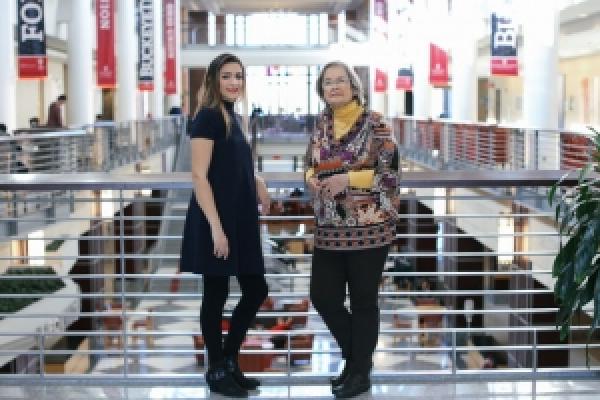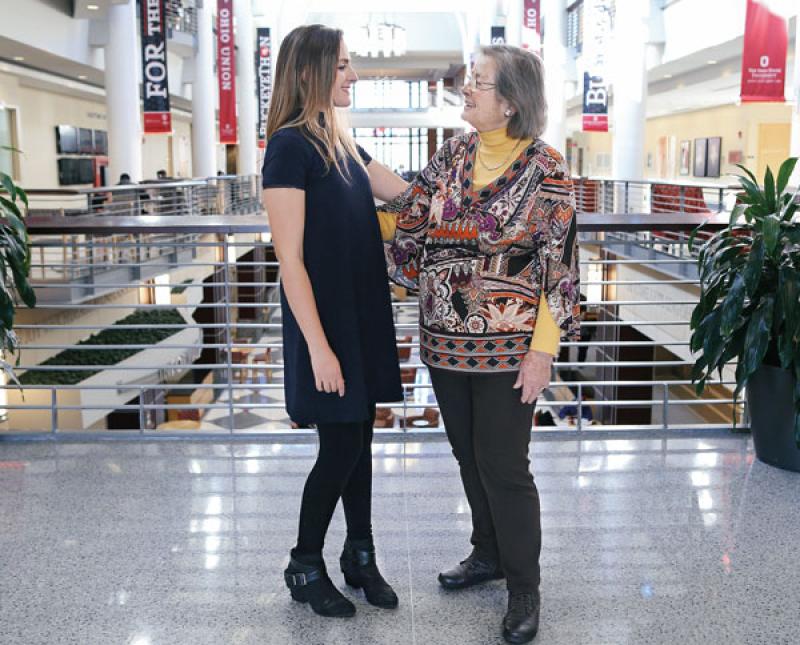Speaking the Same Language: A Modern Greek Travel Award Donor and Recipient Talk Modern Greek

Featured in ASCENT, News from the College of Arts and Sciences, Spring 2017
Speaking the Same Language
Litsa Kozyris (BS, elementary education, 1985; MA, history, 1994) is passionate about enabling study-abroad experiences for students in Greece, which inspired her to create the Phaedon John Kozyris and Litsa Kozyris Travel Award, named for herself and her late husband, Ohio State Law Professor John Kozyris.
The endowed award provides financial support for students to study Modern Greek language and engage in research in Greece. This past summer, three undergraduates studying Modern Greek were the first to benefit from the fund.
“When you travel to Greece today, you are not just traveling to Greece; you are taking a journey to classical times and early Christian times. In the 18th and 19th centuries in Greece, an indispensable part of an education was to go abroad,” Kozyris said.
An enthusiastic educator, Kozyris teaches Modern Greek language and culture everywhere she goes. She is an insatiable learner who believes teaching and learning are interactive processes.
“It is important to learn firsthand by traveling, to talk to the people, find out how they feel, listen to their jokes, absorb their philosophy, to learn their language — and to share,” said Kozyris. “Travel should be a way to meet people, not just see things, and learn, not passively through books or movies.”
Kozyris, a true citizen of the world, divides her time between Thessaloniki, Greece, and Columbus, Ohio, and travels to as many other places on the planet as possible.

Stavroula Pabst, a fourth-year student majoring in history and Modern Greek, was one of the three students chosen to study at the University of Athens last summer, courtesy of the Phaedon John Kozyris and Litsa Kozyris Travel Award.
“I was gifted with a wonderful opportunity to spend more time in a country I consider to be my second home, as well as meeting many different people from around the world who were just as interested in learning about Modern Greek as I was,” Pabst said.
“While the classes, taught in Greek, were somewhat intimidating, it was an amazing experience to meet so many students from other countries — Bulgaria, Russia, Germany, Italy — and see their passion for Greek, Greece and learning languages in general. My Greek has improved greatly as a result; it was a key period to work toward fluency in another language.”
As an educator, Kozyris fully understands that classroom learning is a key piece in the educational process. But she firmly believes it is but one piece. “We do not just learn in formal, structured situations. Learning is always taking place, everywhere, if one is open to new experiences,” she said.
Kozyris knows firsthand that traveling offers unparalleled opportunities for experiences not to be found by any other means. “Travel allows me to reimagine and recreate myself,” Kozyris said. “Gaining better understanding of other people and their cultures increases understanding of yourself.”
Pabst has taken advantage of every opportunity at Ohio State to complement and supplement her classroom learning. In summer 2014, Pabst had the chance to work with History Professor Timothy Gregory’s Kythera Program on the Greek island of Kythera through The Ohio State Excavations at Isthmia.
“I did field work and learned the basics of archaeological survey around the island, and had the chance to see and do interesting things from all time periods of the island’s history,” said Pabst.
In spring 2015, Pabst was one of the students selected to take part in History Professor David Steigerwald’s World War II study-tour program. A unique component of this program is the requirement for students to blog about their experiences in London, Normandy, Paris and Berlin. These become part of an indelible living-learning legacy
